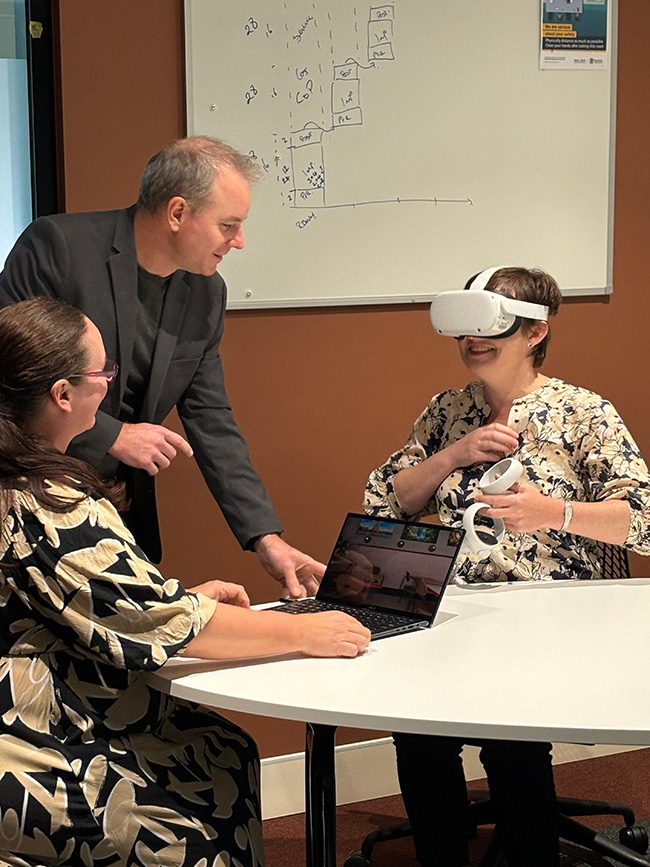Co-creating virtual environments with consumers to enhance self-awareness and preparedness for home after brain injury
Globally 27 million people are affected by traumatic brain injury (TBI), occurring mostly in young people. Changes to cognitive skills (such as memory or attention) are common after TBI, including self-awareness.
Self-awareness is a person’s understanding of changes in their abilities after an injury and the impact those changes have on their functioning and independence. Providing feedback about performance has been shown to help improve self-awareness after brain injury, for example, practising everyday activities of meaning and importance and receiving feedback about performance, including video feedback.
There is often limited or no opportunity for a person in hospital to experience doing the usual everyday activities people do at home or in the community, such as going shopping or taking a train or bus, for example. Consumers with TBI and clinicians have said that practising activities in simulated environments using virtual reality while in hospital could help people feel more prepared to do things in home and community settings. This project will work with consumers with brain injury and clinicians to co-create, develop and test a virtual reality-based intervention.
Background
 To find innovative ways to apply evidence-based feedback approaches earlier in rehabilitation, we have explored the perspectives of people with TBI and clinicians about virtual reality and what they view to be most important and useful to design for use in rehabilitation. Consumers and clinicians felt that virtual reality was promising and that it could be a valuable addition in rehabilitation after brain injury. They identified a range of design features and scenarios as needed for people with brain injury.
To find innovative ways to apply evidence-based feedback approaches earlier in rehabilitation, we have explored the perspectives of people with TBI and clinicians about virtual reality and what they view to be most important and useful to design for use in rehabilitation. Consumers and clinicians felt that virtual reality was promising and that it could be a valuable addition in rehabilitation after brain injury. They identified a range of design features and scenarios as needed for people with brain injury.
This project will take forward priorities identified by people with TBI and clinicians and the virtual reality tools co-created will build in evidence-based feedback approaches. This project will co-design the virtual reality tools with consumers, rehabilitation practitioners and technology experts and explore their feasibility, efficacy and implementation in a hospital brain injury rehabilitation setting.
The specific aims of this research project are to:
- Use co-design methods and human-centred design principles to work in partnership with consumer co-designers, TBI rehabilitation clinician co-designers and virtual reality developers, to co-create a virtual reality-based self-awareness intervention
- Determine the acceptability, feasibility, safety, satisfaction with and preliminary effectiveness of developed intervention, and
- Explore how (and if) the intervention works in the hospital setting and to understand factors impacting use.
Project team
- Dr Emmah Doig
- Professor Trevor Russell
- Dr Hannah Gullo
- Professor Jennifer Fleming
- Dr Elizabeth Beadle
- Dr Clare Burns
- Dr Freyr Patterson
- Associate Professor Mark Chatfield
- Professor Nadine Foster
- Dr Lisa Anemaat
- Ms Alison Bell
- Associate Professor Fatima Nasrallah
- Ms Jennifer Muller
Partnership organisations
- Surgical Treatment and Rehabilitation Service (STARS) Education and Research Alliance, The University of Queensland and Metro North Health
- School of Health and Rehabilitation Sciences, RECOVER Injury Research Centre and the QLD Brain Institute, The University of Queensland
- Metro North Hospital and Health Service, Surgical Treatment and Rehabilitation Service (STARS hospital)
Community and Consumer Involved Organisations
- Health Translation Queensland (HTQ)
- QLD Brain Injury Collaborative (QBIC)
- 2023 Medical Research Future Fund: Consumer-Led Research Grant
- 2022 UQ Early Career Research Development Knowledge Exchange & Translation (Kx&T) Fund Award (seed funding)
- 2022 Health Translation Queensland Microgrant (seed funding)
